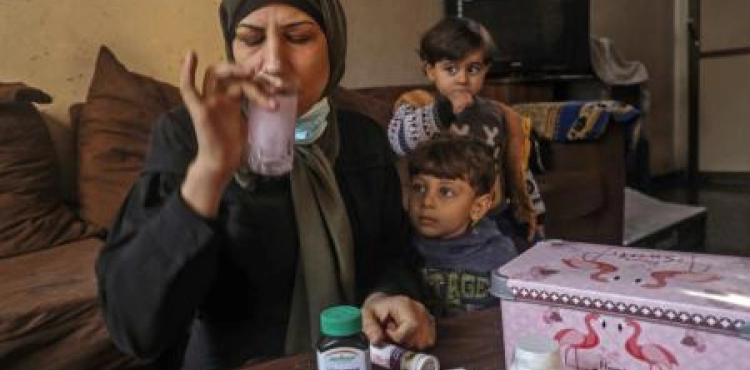Tahani Al-Rifi’s health condition has deteriorated as a result of her stopping radiation therapy sessions for cancer due to the closure measures to confront the Corona virus, and she tells AFP, “My life has turned for the worse” since the start of the pandemic.
Three years ago, Tahani Al-Rifi, 34, a resident of Gaza, was diagnosed with thyroid cancer. She began undergoing two sessions of radioactive iodine treatment every month in a government hospital in Hebron, in the southern occupied West Bank, but treatment stopped six months ago.
"My life has turned for the worse since the beginning of the Corona outbreak, due to the closure of the crossings with Israel and Egypt. ... My radiotherapy is not available in Gaza, but only in Hebron," she says.
The first local cases of the virus were recorded in the Gaza Strip last August, among four members of the same family living in the Maghazi refugee camp.
As part of their measures to limit the spread of the virus, the Israeli authorities closed the Beit Hanoun (Erez) crossing in the northern Gaza Strip, which is the only crossing that it used to allow individuals with special permissions to pass through. Since that time, the Hebrew state has permitted only the transfer of severe cases of patients for treatment in its hospitals or Palestinian hospitals in East Jerusalem and the West Bank.
Since 2006, Israel has imposed a blockade on the Strip, where nearly two million people live, and the poverty rate has exceeded 53 percent.
For years, Egypt has closed the Rafah border crossing, which is the only window for the Gaza Strip’s residents to the world without passing through Israel, and has opened it at long intervals to humanitarian cases.
On Monday, Egypt reopened the crossing for four days for humanitarian cases.
The Aid and Hope Cancer Care Program in the Gaza Strip says that there are about 7,000 cancer patients in the Gaza Strip. Sector officials say hundreds of them are waiting to be allowed to travel for treatment.
"My treatment trip was delayed for about a year. Blood tests showed negative signs of my condition. I am now living on sedatives after I started to feel severe pain in the feet and neck," said Al-Rifi, who was wearing a pink mask.
From August to Tuesday noon, the Gaza Strip counted about 52,000 HIV infections and 523 deaths.
On Tuesday, the Palestinian Authority began vaccinating residents in the West Bank, provided that the campaign also includes the Gaza Strip. The occupied West Bank recorded more than 108,000 injuries and 1,325 deaths.
Reem Fathy (18 years), from Gaza, suffers from leukemia. "I got several times an Israeli approval to travel for treatment and take doses at Al-Makassed Hospital (in East Jerusalem) because of the severity of my condition," she told AFP.
And she adds, "But I prefer to endure the pain and pain than to travel to Jerusalem and get exposed to Corona infection and die."
According to the director of the Aid and Hope Program for Cancer Care in the Gaza Strip, Iman Shanan, "Cancer patients are the least immune and vulnerable in facing Covid-19, and they are more entitled to care and prevention."
"During the past year, most of the cancer patients were not able to leave Gaza to receive treatment, except in life-saving cases," Shanan added.
The Corona virus is not the only one that has caused the deterioration of the health status of cancer patients in the Gaza Strip.
"The health system is fragile, the Israeli blockade and the closure of crossings, the shortage of medicines and health devices, and the cancer patient in Gaza is the one who pays the price," Shanan said.
"The patient faces two options: either he stays at home and dies, or he leaves his home and risks contracting the virus to receive treatment. Our society is poor, unemployment is high, and sterilizers are not accessible to people," she added.
According to a study conducted by the University of Bath in Britain, "the unwillingness to enter the hospital is not only due to fear of infection, but also concern about losing a large part of an individual´s income, especially if it is necessary to isolate himself."
The study, published on Wednesday, adds that "financial insecurity is also exacerbated by the fact that patients are apparently compelled to pay for their medication out of pocket."
The study estimates that "thousands" of chronically ill Gazans are deprived of adequate health care due to the closure of the crossings.
And Tahani hopes to be able to travel to complete her treatment journey.
"I hope the Erez crossing will open within the next two months," she says, before adding, "I need 1,800 shekels (about $ 500) for travel and overnight expenses in Hebron. I will borrow it if I get Israeli permission for treatment."
Her father, Radwan al-Rifi, 70, who has a thick white beard, interrupts her.
The father adds, "Her health is intolerable, we will pay all the necessary money so that she does not die."












